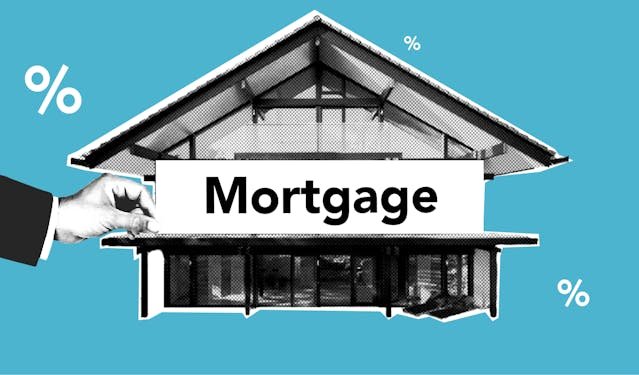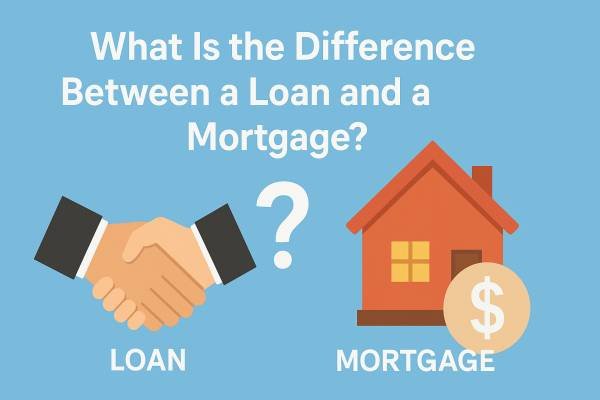Key Points to Know About Mortgage Loans As A First-Time Home Buyer

The process of getting mortgage loans can be quite overwhelming and challenging for a first-time home buyer. There are so many options and variables to consider that it’s easy to feel overwhelmed.
However, with proper guidance, you can make an informed decision and find the perfect mortgage loan that suits your needs.
In this article, we will break down the key points about mortgage loans for a first-time home buyer, from understanding credit scores to government-backed loans.
Upon completing this journey, you will gain a comprehensive understanding of mortgage loans and gain the confidence to begin owning your dream home.
Who is a first-time home buyer?
Congratulations if you’re considering mortgage loans as a first-time home buyer! You’re taking a significant step towards owning your dream home. But what exactly defines a first-time home buyer? It’s not just a label; it’s a milestone moment that marks the beginning of a new chapter in your life.
Buying your first home is an exciting experience filled with anticipation and possibility. You’re building a foundation for your future, creating a space to grow, and making memories that will last a lifetime. As a first-time home buyer, you’re not just purchasing a property but investing in a dream.
Defining First-Time Home Buyer
A first-time home buyer is an individual who has never owned a home or hasn’t owned a home in the past three years. This definition applies to various government-backed mortgage programmes, such as FHA loans, VA loans, and USDA loans, which offer more lenient credit score requirements, lower down payments, and reduced mortgage insurance premiums. These programmes are designed to make homeownership more accessible and affordable for those taking their first step into real estate.
A first-time home buyer is a person who is looking to buy a property for the first time. You can’t be classified as a first-time home buyer if you have ever:
- Owned a property before, even if you are currently renting.
- Owned a property through a shared ownership scheme.
- Owned a property with somebody else, including family, a partner, or a friend.
- Owned a holiday home or property abroad.
You must also buy for your main residence; you cannot buy a second home or an investment.
If you or your partner have previously owned a property, you may not be eligible to be classified as a first-time buyer when you both plan to purchase a house or flat together.
You may not qualify for certain benefits exclusively available to first-time buyers, such as reduced stamp duty rates or government-funded assistance schemes.
It is important to check the eligibility criteria for first-time buyers before making any property purchase decisions.
Breaking Down Barriers
As a first-time home buyer, you may face unique challenges, such as limited credit history, high-interest rates, or daunting down payment requirements. However, with the right guidance and resources, you can overcome these obstacles and find a mortgage loan that suits your needs. From fixed-rate mortgages to adjustable-rate options, there’s a solution tailored to your financial situation and goals.
What are mortgage loans for a first-time home buyer?
Mortgage loans for first-time home buyer are specialised financing options designed to help individuals purchase their first home. These loans typically offer more favourable terms, such as:
- Lower down payment requirements (as low as 3-3.5%)
- Easier credit score qualifications
- Lower interest rates
- Reduced mortgage insurance premiums
- More lenient debt-to-income ratios
- Government-backed guarantees (FHA, VA, USDA)
- Assistance with closing costs
These features aim to make homeownership more accessible and affordable for those taking their first step into real estate. First-time homebuyer mortgage loans cater to individuals who have never owned a home or haven’t owned one in the past three years, providing a helping hand into the world of homeownership.
A mortgage is a legal agreement between the borrower and the lender in which the borrower pledges their property (usually the home they purchase) as collateral. The property is the home itself.
When a person wants to purchase a home, they may need to take out a loan from a lender.
If the borrower cannot make their mortgage payments, the lender has the legal right to take possession of the property and sell it to recover the amount owed.
Mortgages typically have a fixed term (e.g., 15, 20, or 30 years) and an interest rate, which determines the cost of borrowing.
The borrower makes regular payments to the lender over the mortgage term until the loan is paid in full.
Understanding The Basics of Mortgage Loans as a First-time Home Buyer

A mortgage loan for a first-time home buyer is a specialised financial tool designed to help you achieve your dream of owning a home. It’s a type of home financing that provides more favourable terms and assistance to those taking their first step into homeownership.
This mortgage loan offers lower credit score requirements, reduced down payments, and lower mortgage insurance premiums.
If you plan to buy a house but have a lower credit score, you still have hope. You can qualify for a mortgage loan even with a lower credit score.
You can put down as little as 3.5% of the purchase price and still qualify for a mortgage. This flexibility in the down payment amount makes it easier for homebuyers to enter the housing market.
Additionally, with lower down payments, you can enjoy lower monthly payments. This option can be helpful for those who may not have enough savings to make a larger down payment but still want to become homeowners.
A mortgage loan for a first-time home buyer offers several benefits, including:
- Lower down payment requirements (as low as 3.5%)
- More lenient credit score requirements (as low as 500)
- Reduced mortgage insurance premiums
- Lower interest rates
- Assistance with closing costs
Types of mortgage loans for first-time home buyer.
Here are some types of mortgage loans for first-time home buyers:
- FHA Loans: The Federal Housing Administration is responsible for insuring these loans. If you’re looking to buy a home for the first time, you may be eligible for an FHA loan. This type of loan requires a down payment of only 3.5% and a credit score of 500 or above.
- USDA Loans: The U.S. Department of Agriculture offers these loans for homebuyers purchasing homes in rural areas. First-time homebuyers can qualify for a USDA loan with no down payment and a credit score of 640 or above.
- VA Loans: The U.S. Department of Veterans Affairs offers these loans to military personnel, veterans, and their spouses. First-time homebuyers can qualify for a VA loan with no down payment and a credit score of 620 or above.
- Conventional Loans: Private lenders offer these loans, and the government does not insure them. First-time homebuyers can qualify for a conventional loan with a down payment as low as 3% and a credit score of 620 or above.
- My First Texas Home Programme: This programme offers 30-year fixed-rate mortgage loans to first-time homebuyers in Texas. The programme assists with down payments and closing costs up to 5% of the loan amount.
- NJHMFA Down Payment Assistance Programme: This programme offers up to $15,000 for qualified first-time homebuyers in New Jersey to use as down payment and closing cost assistance.
- TDHCA Programmes: The Texas Department of Housing and Community Affairs offers various programmes for first-time homebuyers, including 30-year fixed-rate mortgage loans with assistance for down payments and closing costs.
What is the purpose of a mortgage loan?
The specific purposes of a mortgage loan may vary depending on the lender, loan programme, and borrower’s circumstances.
- Purchasing a Home: A mortgage loan allows borrowers to purchase a home by providing the necessary funds for the purchase price.
- Refinancing: Refinancing a mortgage loan involves replacing an existing loan with a new one, often to take advantage of lower interest rates or tap into equity.
- Home Improvements: Mortgage loans can finance renovations, repairs, or upgrades.
- Debt Consolidation: Mortgage loans can consolidate debt by paying off high-interest loans or credit cards.
- Cash-Out Refinancing: This involves refinancing a mortgage loan to access cash for various purposes, such as paying off debt or financing a business.
- Investment Properties: Mortgage loans can be used to purchase investment properties, such as rental properties.
- Construction Loans: Mortgage loans can be used to finance the construction of a new home.
- Home Equity Loans: These loans allow homeowners to tap into the equity in their homes for various purposes.
- Second Homes: Mortgage loans can be used to purchase a second home or vacation home.
- Reverse Mortgages: These loans allow homeowners to access the equity in their home and receive regular payments or a lump sum.
- Jumbo Loans: These loans are used for high-priced homes and exceed conforming loan limits.
- Government-Backed Loans: Mortgage loans insured by government agencies, such as FHA, VA, and USDA, offer benefits like lower down payments and easier qualification.
The legal effect of a mortgage on property transaction

When you take out a mortgage loans as a first-time home buyer, you enter into a legally binding contract. This contract gives the lender certain rights over your property, including:
- The right to foreclose on your property if you default on loan payments
- The right to sell your property to recoup their losses
- The right to dictate certain terms of the loan, such as interest rates and repayment terms
Understanding Your Rights and Obligations
As a first-time home buyer, it’s crucial to understand your rights and obligations under the mortgage agreement. This includes:
- Making timely loan payments to avoid default
- Maintaining adequate insurance coverage on your property
- Complying with local property regulations and taxes
Protecting Your Interests
To protect your interests, always:
- Carefully review your mortgage agreement before signing
- Seek legal advice if you’re unsure about any terms or conditions
- Make timely payments and maintain open communication with your lender
Mortgage Application Process
The mortgage application process involves the following processes:
- Pre-approval (1-3 days): Estimate how much you can borrow.
- Home Search (variable): Find your dream home and make an offer.
- Mortgage Application (1-2 weeks): Submit a formal application with financial documents.
- Processing and Underwriting (2-4 weeks): Lender reviews application, orders appraisal, and checks credit.
- Closing (1-2 weeks): Sign loan documents, transfer funds, and receive keys.
Additional Tips:
- Work with a reputable lender and real estate agent.
- Provide documentation promptly.
- Ask questions if you are unsure.
This process typically takes 6–12 weeks but may vary depending on individual circumstances, as so many other factors could come into play.
Online Mortgage Application And Approval Process
The online mortgage application simplifies the journey to your dream home and makes your experience faster, easier, and more convenient! It is meant to save time, reduce stress, and be one step closer to unlocking your dream home.
The Digital Advantage
Gone are the days of paperwork and lengthy meetings. With online mortgage applications, you can:
- Apply from the comfort of your own home (or on-the-go!)
- Upload required documents with ease.
- Receive instant pre-approvals and real-time updates
- Compare rates and terms from multiple lenders
A Seamless Experience
The online approval process typically involves the following:
- Pre-approval: Get an instant estimate of your loan amount and interest rate.
- Application: Fill out a secure online form with personal and financial information.
- Document upload: Share required documents, like pay stubs and bank statements.
- Processing: Lenders review your application and order an appraisal (if needed).
- Approval: Receive final approval and review loan terms before signing.
Tips and Tricks
- Ensure a stable internet connection and compatible devices.
- Have all the necessary documents ready for upload.
- Don’t hesitate to contact customer support for assistance.
Why do you need a mortgage?
As a first-time home buyer, financing your dream home is one of the most significant hurdles to overcome. This is where a mortgage loans comes in—a crucial step in making home-ownership a reality.
Unless you have the cash to pay for a home upfront (which is rare!), a mortgage loan is necessary to secure the funds needed to purchase a property. A mortgage loan allows you to borrow money from a lender, use the property as collateral, and repay the loan over time with interest.
A mortgage loan offers several benefits for first-time home buyers, including:
- Affordability: A mortgage loan allows you to purchase a home with a smaller upfront payment, making it more affordable and accessible.
- Flexibility: Mortgage loans come with various repayment terms, such as 15-year or 30-year mortgages, allowing you to choose a plan that suits your financial situation.
- Building Equity: As you repay your mortgage loan, you build equity in your home, which can be a valuable asset for future financial goals.
- Tax Benefits: Homeownership comes with tax deductions for mortgage interest and property taxes, which can help reduce your taxable income.
Mortgage Loans Checklist for First-Time Home Home Buyer
This is a general checklist; specific requirements may vary depending on your situation and location. Always consult with professionals and do your research to ensure a smooth and successful homebuying experience!
Here is a comprehensive mortgage checklist for a first-time home buyer:
Credit and Finances
- Check credit score (aim for 700+)
- Gather financial documents:
- Pay stubs
- Bank statements
- Tax returns
- Identification documents (ID, passport, etc.)
- Proof of income and employment
- Determine debt-to-income ratio
- Calculate affordability and borrowing power
Mortgage Options
- Research and compare lenders
- Consider government-backed loans (FHA, VA, USDA)
- Explore conventional loan options
- Choose between fixed-rate and adjustable-rate mortgages
Pre-Approval and Application
- Get pre-approved for a mortgage loan
- Finalize mortgage application:
- Submit all required documents
- Lock in interest rate
- Review and sign the loan agreement
Mortgage Terms and Conditions
- Understand interest rates and fees
- Review repayment terms (15-year, 30-year, etc.)
- Consider additional costs (insurance, property taxes, etc.)
- Review and understand loan conditions and clauses
Home Search and Purchase
- Find a home within budget
- Make an offer and negotiate terms
- Conduct home inspection and appraisal
- Finalize purchase and closing process
Additional Tips
- Seek professional advice (financial advisor, mortgage expert)
- Consider working with a real estate agent
- Research and understand local market conditions
- Plan for ongoing costs (maintenance, repairs, etc.)
Mortgage Payment Overview
As a first-time home buyer, understanding your mortgage payment is crucial to ensuring a smooth and stress-free homeownership experience.
A mortgage loan for a first-time home buyer can be a significant financial commitment, and knowing what you’re getting into is essential.
Breaking Down Your Mortgage Payment
Your monthly mortgage payment typically consists of four components:
- Principal: The amount borrowed to purchase the property.
- Interest: The cost of borrowing money, calculated as a percentage of the principal.
- Taxes: property taxes, which vary depending on your location.
- Insurance: Homeowners insurance covers damages and losses.
Understanding Your Mortgage Payment Schedule
Your mortgage payment schedule outlines how much you’ll pay each month and how much of that payment goes towards principal, interest, taxes, and insurance. In the early years of your mortgage, a larger portion of your payment goes towards interest. As you pay the principal, more of your payment goes towards owning your home outright.
Mortgage Payment Protection Insurance
MPPI is an insurance policy that covers your mortgage payments in case of unforeseen events. It provides peace of mind and financial security, ensuring your home remains yours, even in challenging times.
How does MPPI work?
MPPI typically covers:
- Job loss or redundancy
- Accidents or illness
- Disability or death
If you’re unable to work due to any of these reasons, MPPI kicks in, covering a portion or all of your mortgage payments for a specified period. This allows you to focus on recovery without worrying about losing your home.
Why Do First-Time Home Buyers Need MPPI?
As a first-time home buyer, you will likely have a larger mortgage payment and a tighter budget. MPPI provides an added layer of protection, ensuring that your mortgage payments are made on time, even if you cannot work.
Mortgage Payments and Calculations
Understanding mortgage payments and calculations is crucial for a first-time home buyer to make informed decisions about their dream home. A mortgage loan for a first-time home buyer can be complex and overwhelming, but breaking down the numbers can make it more manageable.
Understanding Your Mortgage Payment
Your monthly mortgage payment typically includes:
- Principal (the amount borrowed)
- Interest (the cost of borrowing)
- Taxes (property taxes)
- Insurance (homeowners insurance)
Mortgage Calculations: What You Need to Know
- Loan-to-Value (LTV) Ratio: The percentage of your home’s value borrowed (e.g., 80% LTV means you borrowed 80% of the home’s value).
- Interest Rate: The percentage at which you borrow money (e.g., a 4% interest rate means you’ll pay 4% of the loan amount annually).
- Term: The length of your mortgage (e.g., 15-year- or 30-year).
Tips for First-Time Home Buyers
- Use online mortgage calculators to estimate your monthly payments and explore different scenarios.
- Consider working with a mortgage broker to find the best loan options.
- Don’t forget to factor in additional costs like closing costs, appraisal fees, and inspections.
A real-world example is buying a $300,000 home with a 20% down payment ($60,000) and a 30-year mortgage at 4% interest. Your monthly payment would be approximately $1,432.
Mortgage Financing
Mortgage financing usually involves a fixed or variable interest rate, and the borrower is usually required to make monthly payments over a set period of time until the loan is fully paid off. Depending on the specific terms of the loan, mortgage financing can be a great way to access the funds needed to purchase or maintain a real estate property.
When it comes to mortgage financing, you have several options. Here are a few:
- Fixed-Rate Mortgages: These offer a stable interest rate and monthly payment for the life of the loan.
- Adjustable-Rate Mortgages: These feature a variable interest rate that may change over time.
- Government-Backed Loans: FHA, VA, and USDA loans offer favourable terms and lower down payments.
Mortgage Refinancing
Mortgage refinancing is replacing your existing mortgage loan with a new one, often with a different interest rate, payment schedule, or loan amount. You’re essentially trading your old loan for a new one with better terms.
Why Refinance Your Mortgage Loan?
So, why would you want to refinance your mortgage loan as a first-time home buyer? Here are a few compelling reasons:
- Lower Interest Rates: Refinancing can help you snag a lower rate and reduce your monthly payments if interest rates have dropped since you took out your original loan.
- Lower Monthly Payments: Extending your loan term or switching to a lower interest rate can reduce your monthly payments and free up more money in your budget.
- Tap into Home Equity: If your home has increased in value, you can refinance your loan to tap into that equity and use it for home improvements, paying off debt, or covering other expenses.
- Remove Private Mortgage Insurance (PMI): If you put down less than 20% when you bought your home, you’re likely paying PMI. Refinancing can help you eliminate this extra cost.
How to Qualify For A Mortgage
Qualifying for a mortgage loan as a first-time home buyer requires preparation and knowledge. It is essential to work with a mortgage expert who can guide you through the process and ensure a smooth journey to homeownership.
The following are the major steps towards qualifying for a mortgage as a first-time home buyer;
Check Your Credit Score
Your credit score plays a significant role in determining your eligibility for a mortgage loan. A good credit score indicates to lenders that you’re responsible with credit and can repay the loan. Aim for a score of 700 or higher to increase your chances of approval.
Gather Financial Documents
Lenders need to verify your income, employment, and financial stability. Be prepared to provide:
- Pay stubs
- Bank statements
- Tax returns
- Identification documents (ID, passport, etc.)
- Proof of income and employment
Understand Debt-to-Income Ratio
Lenders calculate your debt-to-income (DTI) ratio to ensure you’re not overextending yourself. Your DTI ratio, including future mortgage payments, should be below 36%.
Choose the Right Mortgage Option
Explore various mortgage options, such as:
- Fixed-rate mortgages
- Adjustable-rate mortgages
- Government-backed loans (FHA, VA, USDA)
- Conventional loans
Get Pre-Approved
Before house hunting, get pre-approved for a mortgage loan. This gives you an idea of how much you can borrow and makes you a more attractive buyer to sellers.
Additional Tips
- Save for a down payment: Aim for 20% to avoid private mortgage insurance (PMI).
- Research mortgage lenders: Compare rates and terms to find the best deal.
- Work with a mortgage broker: They can help you navigate the process and find the perfect loan.
Parties to a Mortgage Loan Transaction
One crucial aspect is the parties involved in a mortgage loan transaction. Knowing who’s who can help you make informed decisions and avoid potential pitfalls.
The Borrower: You, the First-Time Home Buyer
As the borrower, you’re the individual seeking to purchase a home. You’ll be responsible for repaying the loan, interest, and other costs. As a first-time home buyer, you may be eligible for special loan programmes and incentives, such as FHA or VA loans.
The Lender: The Mortgage Loan Originator
The lender is the financial institution or entity providing the mortgage loan. They’ll assess your creditworthiness, income, and other factors to determine your eligibility for a loan. Be prepared to provide documentation, such as pay stubs and bank statements, to support your application.
The Mortgage Broker: Your Loan Matchmaker
A mortgage broker acts as an intermediary between you and multiple lenders. They’ll help you shop for the best loan options, interest rates, and terms. Brokers can save you time and effort, but they may charge fees for their services.
The Underwriter: The Risk Assessor
The underwriter evaluates your loan application, verifying your income, credit history, and other factors to determine the level of risk involved. They’ll assess whether you’re a good candidate for the loan and ensure that the lender is making a sound investment.
The Closing Agent: The Deal Closer
The closing agent, often a title company or attorney, facilitates the final stages of the transaction. They’ll prepare documents, conduct the closing meeting, and ensure that the loan is properly recorded.
The Servicer: The Loan Manager
After closing, the servicer takes over managing your loan and collecting payments. They may also handle tasks like property tax and insurance payments.
Mortgage limitations for homeowners
As a first-time home buyer, securing a mortgage loan is a significant milestone. However, it’s essential to understand the limitations that come with this crucial step.
Knowing what to expect can help you navigate the process and make informed decisions about your mortgage loan.
Debt-to-Income Ratio: Don’t Overextend Yourself
Lenders consider your debt-to-income (DTI) ratio when evaluating your mortgage application. This ratio calculates your monthly debt payments (including the proposed mortgage) as a percentage of your gross income. Typically, lenders prefer a DTI ratio of 36% or less. Exceeding this limit may impact your loan terms or even lead to rejection.
Loan-to-Value Ratio: How Much Can You Borrow?
The loan-to-value (LTV) ratio determines how much you can borrow based on the property’s value. For example, an 80% LTV means you can borrow 80% of the property’s value while covering the remaining 20% with a down payment or other funds. Higher LTV ratios may require private mortgage insurance (PMI).
Credit Score: A Crucial Factor
Your credit score significantly influences your mortgage loan options. A good credit score can lead to better interest rates and terms, while a poor score may result in higher interest rates or even loan denial. As a first-time home buyer, monitoring and improving your credit score before applying for a mortgage loan is crucial.
Mortgage Insurance: Protecting Your Investment
Private mortgage insurance (PMI) is often required for borrowers with lower down payments (typically less than 20%). PMI protects the lender in case of default but can increase your monthly mortgage payments. Understand the terms and conditions of PMI before committing to a mortgage loan.
Prepayment Penalties: Understand the Fine Print
Some mortgage loans come with prepayment penalties, which can make it costly to refinance or pay off your loan early. Be sure to review your loan terms carefully and ask questions if you’re unsure about any conditions.
The life cycle of a mortgage loan
Understanding a mortgage loan’s life cycle can help you confidently navigate the process as a first-time home buyer. From application to payoff, a mortgage loan goes through various stages that impact your financial journey. Let’s break down the key phases to ensure you’re well-prepared for this significant investment.
Pre-Approval and Application (Weeks 1-4)
Your mortgage loan journey begins with pre-approval, where you’ll provide basic financial information to get an estimate of how much you can borrow. Once you find your dream home, you’ll submit a formal application, providing detailed documentation, such as proof of income and credit reports.
Processing and Underwriting (Weeks 5-12)
The lender’s team will review your application, order appraisals, and assess your creditworthiness. This stage may involve additional documentation or clarifications. Be patient, as this phase is crucial in determining your loan terms.
Closing and Funding (Weeks 13-16)
This is the closing stage, where you’ll sign the final documents, transfer ownership, and receive the keys to your new home. The lender will disburse the funds, and you’ll start making mortgage payments.
Servicing and Repayment (Years 1-30)
Your lender will manage your loan, collect monthly payments, and handle property tax and insurance payments. Make timely payments to maintain a good credit score and avoid late fees.
Payoff and Discharge (Year 30+)
After years of diligent payments, you’ll finally pay off your mortgage loan! The lender will discharge the mortgage, and you’ll own your home outright.
Mortgaged Property ownership
Mortgage property ownership is a type in which the homeowner has full rights to occupy, use, and enjoy the property, but the lender holds a lien on the property until the loan is fully repaid.
There are also different types of ownership interest in a property, including;
- Sole Ownership: One individual has all of the ownership interest in a property.
- Joint Tenancy: Two or more people hold the title to a property.
- Tenancy by Entirety: An ownership option available to married couples.
- Tenancy in Common: Two or more parties with ownership interests.
- Real Estate Trust: A trustee manages real estate assets for the trustor.
- Owning Partnership (LLC): Investors claim an ownership interest in a property through a limited liability company.
- Owning Corporation: A corporation claims an ownership interest in a property.
Comparing Mortgage Offers
As a first-time home buyer, it’s crucial to compare mortgage offers carefully to find the best deal for your dream home.
When comparing mortgage offers, there are key factors that will help you make an informed decision and avoid costly mistakes. They include the following;
Interest Rates: The Bottom Line
When comparing mortgage offers, the interest rate is a top priority. A lower interest rate can save you thousands of dollars over the life of the loan. Consider a 30-year fixed-rate mortgage with a 4% interest rate versus a 4.5% rate. The difference may seem small, but it can add to significant savings over time.
Fees and Closing Costs
In addition to the interest rate, consider the fees and closing costs associated with each mortgage offer. Some lenders may charge higher fees, while others offer more competitive rates. Be sure to factor in these costs when making your comparison.
Loan Terms: Flexibility Matters
Loan terms can vary significantly between mortgage offers. Consider the length of the loan, the type of interest rate (fixed or adjustable), and any prepayment penalties. A flexible loan term can be beneficial if you refinance or sell your home.
Lender Reputation and Customer Service
Don’t forget to research the lender’s reputation and customer service when comparing mortgage offers. A reputable lender with a proven track record can provide peace of mind and support throughout the loan process.
Determining Mortgage Affordability
Understanding how much home you can afford is essential to avoid financial stress and ensure a smooth mortgage loan experience.
The 28/36 Rule
Lenders use the 28/36 rule to determine mortgage affordability. This rule states that monthly housing costs (mortgage payments, property taxes, and insurance) should not exceed 28% of your gross income. Your total debt payments (including credit cards, car loans, and student loans) should not exceed 36% of your gross income.
Factors Affecting Mortgage Affordability
Several factors affect mortgage affordability, including:
- Income: Your gross income plays a significant role in determining how much home you can afford.
- Credit Score: A good credit score can help you qualify for better interest rates and terms.
- Debt: High levels of debt can reduce your mortgage affordability.
- Interest Rates: The interest rate on your mortgage loan can significantly impact your monthly payments.
Calculating Mortgage Affordability
To calculate mortgage affordability, consider the following steps:
- Determine your gross income.
- Calculate your monthly housing costs (mortgage payments, property taxes, and insurance).
- Calculate your total debt payments (credit cards, car and student loans).
- Ensure your monthly housing costs do not exceed 28% of your gross income and your total debt payments do not exceed 36%.
Shopping For Mortgage Rates
With so many lenders and options available, knowing where to start is hard. But, with the right approach, you can score a great deal on your mortgage loan and set yourself up for long-term financial success.
Why Compare Mortgage Rates?
Comparing mortgage rates is crucial because it can save you thousands of dollars over the life of the loan. Even a small difference in interest rates can add up to significant savings. For example, a 30-year fixed-rate mortgage at 4% interest versus one at 4.5% interest can save you over $20,000 in interest payments over the life of the loan.
Where to Shop for Mortgage Rates
So, where should you start your search? Here are some options:
- Online lenders: Quicken Loans and SoFi offer competitive rates and convenient application processes.
- Traditional banks: Your local bank or credit union may offer attractive rates and personalised service.
- Mortgage brokers: Mortgage brokers can help you compare rates and terms from multiple lenders.
What to Look for When Comparing Mortgage Rates
When comparing mortgage rates, consider the following factors:
- Interest rate: The lower the interest rate, the better.
- APR (Annual Percentage Rate): includes additional fees and costs, so factor it in.
- Points and fees: Some lenders may charge points or fees, so ask about these upfront.
- Loan terms: Consider the length of the loan and any prepayment penalties.
Mortgage Insurance coverage
Mortgage insurance, or private mortgage insurance (PMI), is a type of insurance that lenders require when a homebuyer makes a down payment of less than 20% of the purchase price. This insurance protects the lender in case the borrower defaults on the loan.
How Does Mortgage Insurance Work?
Mortgage insurance typically requires a monthly premium payment, which is added to your mortgage payment. The premium amount varies depending on your credit score, loan amount, and down payment percentage.
Benefits of Mortgage Insurance
While mortgage insurance may seem like an added expense, it offers several benefits:
- It allows for lower down payments (as low as 3%)
- It helps borrowers qualify for a mortgage loan
- It protects the lender in the event of default
When Can You Cancel Mortgage Insurance?
The good news is that you can cancel mortgage insurance once you’ve built up enough equity in your home. This typically occurs when your loan balance exceeds 80% of the original purchase price.
Mortgage Tax Deduction
The mortgage tax deduction is a tax benefit that allows homeowners to deduct the interest paid on their mortgage from their taxable income. If you pay $10,000 in mortgage interest annually, you can subtract that amount from your taxable income, reducing your tax liability.
How Does it Work?
Here’s an example to illustrate how the mortgage tax deduction works:
Suppose you’re a first-time home buyer with a $200,000 mortgage loan at a 4% interest rate. Your annual mortgage interest payment would be $8,000. If you’re in the 24% tax bracket, you can deduct that $8,000 from your taxable income, reducing your tax liability by $1,920 (24% of $8,000).
Benefits for First-Time Home Buyers
The mortgage tax deduction can especially benefit you as a first-time home buyer. Here’s why:
- Reduces tax liability: By deducting your mortgage interest from your taxable income, you can reduce your tax liability and keep more money in your pocket.
- Saves you money: The mortgage tax deduction can save you thousands of dollars over the life of your loan, which can be used for other expenses or savings.
- Encourages homeownership: The mortgage tax deduction is designed to encourage homeownership, making it easier for first-time home buyers to purchase their dream home.
Mortgage-Backed Securities Market
The mortgage-backed securities market is vital to the housing finance system, enabling banks to lend more money to borrowers like you. Here’s how it works:
What are Mortgage-Backed Securities?
Mortgage-backed securities (MBS) are investment products similar to bonds. They’re created when banks bundle together many home loans and sell them to investors. This process is called securitisation. The investors receive periodic payments, similar to bond coupon payments, based on the cash flows from the underlying mortgages.
How Does the Mortgage-Backed Securities Market Work?
Here’s a step-by-step explanation:
- Originators: Banks and other financial institutions originate mortgages for borrowers.
- Aggregators: These mortgages are then sold to aggregators like Fannie Mae, Freddie Mac, or Ginnie Mae.
- Securitization: The aggregators package the mortgages into MBS and sell them to investors.
- Investors: Investors buy MBS to earn returns based on the cash flows from the underlying mortgages.
Benefits of Mortgage-Backed Securities for First-Time Home Buyers
The MBS market provides several benefits for first-time home buyers:
- Increased access to credit: By selling mortgages to investors, banks can free up capital to lend more money to borrowers.
- Lower interest rates: The MBS market helps to reduce interest rates, making it more affordable for first-time home buyers to purchase a home.
- Faster and easier mortgage lending: The MBS market enables banks to lend more efficiently, making it faster and easier for first-time home buyers to get a mortgage.
Types of Mortgage-Backed Securities
There are two main types of MBS:
- Agency MBS: Issued by government-sponsored entities like Fannie Mae, Freddie Mac, and Ginnie Mae. These MBS are considered relatively safe and low-risk investments.
- Non-agency MBS: Issued by private financial institutions, these MBS come with greater risk, and there are no guarantees from the government.
Finding the Best Mortgage Rates
As a first-time home buyer, finding the best mortgage rate is one of your most important decisions. A good mortgage rate can save you thousands of dollars over the life of your loan, making your dream home more affordable.
What is a Mortgage Rate?
A mortgage rate is the interest rate charged on your mortgage loan. It’s expressed as a percentage and determines how much you’ll pay in interest over the life of your loan. For example, if you have a $200,000 mortgage loan with a 4% interest rate, you’ll pay $8,000 in interest over the first year.
Factors Affecting Mortgage Rates
Many factors affect mortgage rates, including:
- Economic conditions: The state of the economy, inflation, and unemployment rates can all impact mortgage rates.
- Federal Reserve decisions: The Federal Reserve sets short-term interest rates, which can influence long-term interest rates like mortgage rates.
- Bond market: Mortgage rates are often tied to the 10-year Treasury bond yield.
- Lender competition: Different lenders offer different rates, so shopping around is essential.
Mortgage Loans Tips and Advice For a First-time Home Buyer
As a first-time home buyer, it’s essential to be informed and prepared to ensure a smooth journey to homeownership.
Here, we’ll share valuable mortgage tips and advice to help you make the best decisions for your financial future.
Understand Your Credit Score
Your credit score plays a significant role in determining the interest rate you’ll qualify for and whether you’ll be approved for a mortgage loan.
A good credit score can help you save thousands of dollars in interest over the life of your loan.
Make sure to check your credit report, dispute any errors, and work on improving your score before applying for a mortgage.
Choose the Right Mortgage Option
With so many mortgage options available, choosing the right one for your situation is crucial. Consider your financial goals, income stability, and long-term plans when selecting a mortgage.
For example, a fixed-rate mortgage may provide stability, while an adjustable-rate mortgage could offer lower initial payments.
Don’t Forget About Closing Costs
In addition to your down payment, you’ll need to factor in closing costs, ranging from 2% to 5% of the purchase price.
These costs include fees for appraisal, title insurance, and loan origination. Be sure to negotiate with your lender to see if they can cover some or all of these costs.
Work with a Mortgage Professional
A mortgage professional can guide you through the process, help you navigate complex terminology, and ensure you get the best deal.
They can also help you explore down payment assistance programmes and other options to make your dream home more affordable.
Additional Tips
- Get pre-approved: Before starting your home search, get pre-approved for a mortgage to understand your budget and negotiating power.
- Shop around: Compare rates and terms from different lenders to find the best deal.
- Consider a co-signer: If you have a limited credit history, consider having a co-signer to improve your chances of approval.
- Read the fine print: Carefully review your loan terms and ask questions if you’re unsure about anything.
Mortgage Pre-approval Process
What is Mortgage Pre-approval?
Mortgage pre-approval is a written commitment from a lender stating that you’re eligible for a specific loan amount based on a preliminary review of your creditworthiness. This document typically includes the loan amount, interest rate, and loan term.
Why Do I Need Mortgage Pre-approval?
Mortgage pre-approval is essential for several reasons:
- Understanding your budget: Pre-approval gives you a clear idea of how much you can afford, helping you focus your home search.
- Negotiating power: A pre-approval letter demonstrates your financial credibility to sellers and real estate agents, giving you an edge in negotiations.
- Streamlined process: Pre-approval accelerates the mortgage application process, as the lender has already reviewed your creditworthiness.
The Mortgage Pre-approval Process
Here’s a step-by-step guide to obtaining mortgage pre-approval:
- Check your credit score: Ensure your credit report is accurate and your score is in good shape.
- Gather documents: Provide proof of income, employment, assets, and identification.
- Choose a lender: Select a reputable lender and contact their mortgage department.
- Submit your application: Complete the pre-approval application, either online or in person.
- Wait for approval: The lender will review your application and issue a pre-approval letter.
Final Thoughts on Mortgage Loans For a First-time Buyer
Securing mortgage loans as a first-time home buyer requires careful consideration and planning. By understanding the key points outlined in this article, you’ll be better equipped to confidently navigate the process and make informed decisions that benefit your financial future.
Happy home-buying!






